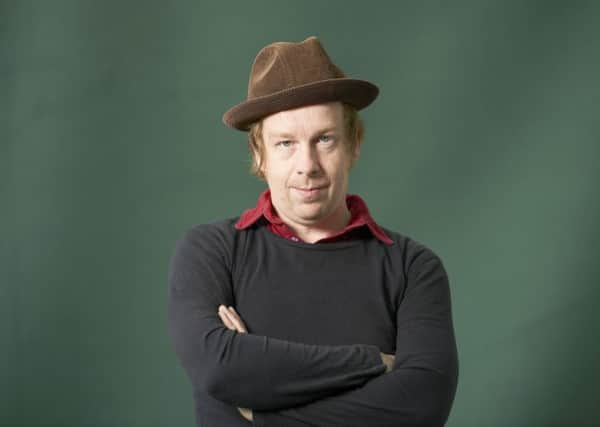Book review: Beatlebone by Kevin Barry


Beatlebone by Kevin Barry | Canongate, £12.99
As I read Kevin Barry’s scintillating new novel, the ghosts of other books kept on rising up. It’s a descent into madness like Malcolm Lowry’s Under The Volcano. Since it’s a portrait of the artist as a middle-aged man, and given Barry’s own prose style, replete with “sea-bite’s hint-of-vulva”, “deathhauntedness” and “a silvering of the blood”, the spectre of James Joyce is never too distant. The quick-fire and oblique dialogue, with its air of menace, recalls early plays of Harold Pinter, like The Birthday Party and The Caretaker. Its sixth chapter breaks the fourth wall, introducing the novelist himself researching his project, and in its obsessions with reclaiming a counter-cultural past and a kind of deranged reportage, it feels like an Irish take on Iain Sinclair’s psychogeography. Beatlebone has an understated supernatural undercurrent that put me in mind of Arthur Machen and William Hope Hodgson. This may make it sound very earnest indeed – and it recently won the Goldsmith’s Prize for Innovation in Fiction – but it’s also very funny indeed: although the substance is like Withnail & I, a lot of the language is more reminiscent of Peter Cook and Dudley Moore’s Derek and Clive sketches (“I’ll tell you one thing you could do… You could put a clean tongue in your head,” says one character at a crucial point).
The central character of Beatlebone is John Lennon. It is May 1978 and Lennon has returned (fiction) to Dorinish, the island in Clew Bay he bought in 1963 (true), to indulge in Dr Janov “scream therapy” (true), abetted by the sinister and soft-hearted Puckish figure of one Cornelius O’Grady (fiction, I am very much hoping). At a time when he has “no peace, no sleep, no meaning” and with a head full of “love, blood, fate, death, sex, the void, mother, father”, Lennon asks to be left on his island for three days “that he might scream his f***ing lungs out and scream the days into nights and scream to the stars by night – if stars there are and the stars come through”. Cornelius is to divert the press pack, protect Lennon and ship him out to and back from Dorinish – but along the way will also introduce black pudding and ducks’ eggs to Lennon’s macrobiotic diet, take him to a midnight shebeen, share his own stories about disappointing fathers and disappointed mothers, and provide some otherworldly sanity to proceedings. Lennon is left at one point in the (real) Amethyst Hotel with a sadistic and superannuated hippy, Joe Director (who I really hope is fictional), and two twentysomething lost souls, and is forced into a session of “The Rants”. He communes with a seal, plans an unmade album and will eventually reach an epiphany of sorts.
Advertisement
Hide AdSentence for sentence, Barry writes some of the finest prose of anyone currently writing in English. It can be mordantly funny, as in the exchange between a landlady and Lennon – “Do you have a reservation? she says. I have severe ones, he says, but do need a room”. It will turn to elegy, with profound psychological insight in only a few lines – “Your man? she says. You’re very like him. Not as much as I used to be, he says”. The imagery is superlative – a whiskey tastes of “the past and uncles”, a goat curry is “horn and pheromone and dark magic”. In a way, the novel’s strain of utter filthiness serves to cut across the parts that might, in other hands, have seemed fey. An encounter with a hare, which stands “mannishly” and “turns its nose in a tiny mechanical clockwork nidge” is prefaced with “he read once that the hare augurs darkly in Irish mythology. From what he can remember there is f*** all that augurs brightly in the Irish mythology”. The final few pages offer successive closures which could have been sentimental, but after the Walpurgisnacht we have been through earn their place; whether it is Cornelius’s memory of a gap in the hill being a wink, or “there is magic, isn’t there, in the way the Maytime opens out to us?” or “love is so very hard to do” (a clever use of the final verb: not feel, or be).
Although Lennon here is John Lennon he is also a cipher for every burnt-out artist and creative catastrophe. The reader knows the irony latent when Lennon is told that “it’s all hell after fifty”, and that Beatlebone, the unrecorded album so avant-garde it will “make Scott Walker sound like The Mamas And f***ing Papas”, is the idealised dream, an unachievable aesthetic. In a way the fictional Cornelius, who can seem incompetent comedian one minute and Machiavellian schemer the next, faux-salt of the earth one minute and eldritch conjurer the next, is more believable than the supposedly real Lennon. Or perhaps he is just more human.
Beatlebone is a magnificent piece of work. For all its pyrotechnic language and philosophical depth (and riotous comedy) it never stops being about a man struggling with a loveless childhood and the superficial adoration of celebrity. Dr Jakov’s theory is that screaming can release the pent-up aggressions of the hurt child, and to that extent, Beatlebone is a long, lyrical and cathartic scream of itself.